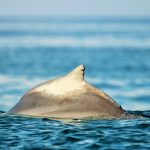Whales, dolphins and penguins are animals that shouldn’t be at the beach so if you see these animals stranded, there probably is something wrong. Seals can spend time on the beach and they can look very tired but usually it is best to leave seals alone and if they haven’t moved after twenty four hours, then they might need human help.
There are many theories why marine animals strand. Healthy cetaceans may strand through navigational error, if they are unfamiliar with the coastline. They might be facing navigation problems due to geomagnetic contours or weather patterns or they might chase the prey too near the shore. Also, strong social bonds may cause healthy animals to follow an injured or diseased animal onto the beach. Animals may also strand alive because they are unhealthy, for example have bacterial, parasitic or viral disease.
So what to do if you see a stranded marine animal on the beach? Always remember that you need local authorities to take care of the situation. First thing you do is call for help (see the contact numbers below) and clear the scene from other people and animals. At any point you don’t approach the animal or touch it. Try to find out as much info as possible for the animal rescuers: is the animal alive or dead, what is the location, what is the species, what is the condition of the animal (activity, trauma, abnormal breathing, air temperature), how long has the animal/animals been stranded and if there has been any attempts to refloat (which should not be done without professional animal handler).
You can do your part helping decrease animal stranding by keeping the oceans clean from waste, fishing equipments and poisons. Remember, by keeping oceans healthy you will keep marine animals healthy as well!
Five key points:
1. Call for help and wait for stranded animal rescue before any action
2. Don’t approach the animal before consulting the vets or first aiders with proper experience/training
3. Get the animal completely off the water head facing away from the ocean
4. Be careful with breathing holes and keep the animal cool and wet, for example with wet towels
5. Remember the social bonds – don’t separate mother from the calf and determine the lead female
If you find a seal, penguin, dolphin or whale, call: Cape Nature: 044 533 2125 or ORCA Foundation: 082 782 4459 or Tenikwa: 044 534 8170


